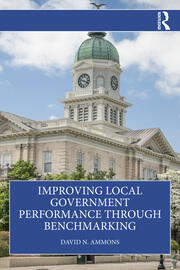David Ammons answers questions about new benchmarking publication

Former School of Government faculty member David Ammons, Albert Coates Professor Emeritus of Public Administration and Government, has authored a new publication. Published in May 2025, Improving Local Government Performance through Benchmarking describes the two types of benchmarking used by local governments—metrics benchmarking and best practice benchmarking—and cites examples and lessons learned across the nation and around the globe, including prominently lessons from the North Carolina Benchmarking Project.
Below, Ammons answers questions about the inspiration behind writing this book, expands on the complex nature of benchmarking for governments, and more.
What drove you to write this publication?
“I have been engaged in benchmarking projects throughout most of my career, including 25 years as a faculty advisor to the North Carolina Benchmarking Project. From experience and study, I have come to recognize and appreciate an array of considerations that shape the design of a benchmarking project and important issues that can affect its success. Writing this book was my opportunity to share what I have learned from my own research and experience, and from the research of other scholars in this field.”
What aspects of benchmarking are misunderstood by governments?
“Several aspects of benchmarking are not fully understood by many governments, but here I will mention two big ones. First, when done properly, benchmarking focuses on performance, not community or organizational characteristics or policies. A comparative inventory of characteristics or policies is not really benchmarking. Second, metrics benchmarking—the most common type of benchmarking in local government and the one most people think of—is not their only choice. Best practice benchmarking is an excellent choice as well.”
What can readers expect to learn from this publication?
“Many decisions are made, initially, in selecting a benchmarking type and, subsequently, in designing a benchmarking project without full consideration of the ramifications of those choices on the ultimate success of the project. Reading this book will help remove these blind spots.”
What are the two major types of benchmarking used by governments, and does one have advantages over the other?
“Most people are familiar with metrics benchmarking, the most common type in local government. Metrics benchmarking is a superb tool for diagnosing a department or program’s performance strengths and weaknesses. But if a manager or supervisor wants prescriptions for improving their unit’s performance, metrics benchmarking won’t do that. Best practice benchmarking will.”
